|
Read below or click this link to download this guide for free.
|
| ||||||
Composts
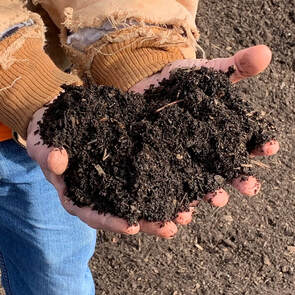
You can offer more than one kind of compost. Different composts may appeal to different customers. However, I’ve found that carrying more than one kind mostly confuses folks; so now I just have one. Your different compost products can differ by:
- feedstocks (the materials that you make the compost out of);
- additives (things you add to the compost); and
- screened or unscreened.
Feedstocks
Some customers will prefer composts that are produced from animal manure. Others will want compost that is from plant material only. Luckily for me, many customers desire compost that is produced from food scraps. As you (and the customers) know, the compost also contains high-carbon feedstocks to balance out the nitrogen from the food scraps. The point is, it’s the food scraps that appeals to customer demand.
The food scrap compost, my premium product, sells for the highest price. Many of my customers have me mix the compost and topsoil.
The food scrap compost, my premium product, sells for the highest price. Many of my customers have me mix the compost and topsoil.
Additives
I don’t use additives at this point, but you may find that your customers respond to them. Things like greensand, biochar, and bone meal are possible additives. If you incorporate these additives, I recommend adding them at the beginning of the composting process.
I do not recommend the use of synthetic fertilizers as additives. The salt content will harm the microbial life that is the core benefit of compost in the first place.
I do not recommend the use of synthetic fertilizers as additives. The salt content will harm the microbial life that is the core benefit of compost in the first place.
Screened or Unscreened
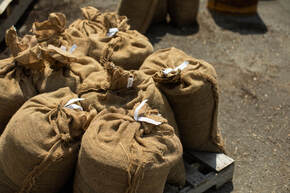
You should definitely screen your compost. However, you may want to offer some of it for sale as unscreened. Some customers will appreciate the option of a lower price, and some will even prefer that it have some coarse material left to degrade over time. I screen all of my compost.
Mulches
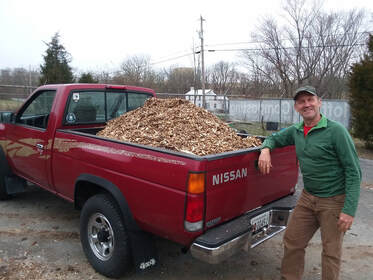
Another set of compost business products are mulches. Different customers also want different kinds of mulch. Hopefully, you will have some on hand that does double duty as a product and bulking agent. The mulches you offer can vary based on:
- size;
- species;
- age; and
- color.
Size
Some customers will want a coarse mulch. The most common uses for coarse mulch are garden paths and other areas for people to walk or play. Most customers will want a finer mulch, especially double ground. If you want to make a significant amount of revenue from mulch, you’ll need to double grind it. This is especially true if you want to sell to landscapers.
Species
If your main source of bulking agent is chipped or ground brush from local tree services (like me), there won’t be much you can do about this. You get what you get. However, if you grow to own your own grinder, it might be worth it to grind up different species separately. Honestly, I haven’t had many customers express a desire for specific species, but it has come up.
Age
Older wood chips (>6 months) are better. This is especially true if you accept chips from tree services. Often, their chips contain a lot of twigs and leaves. After a week or so at your site, you’ll get a big cloud of spores every time you disturb that pile. This is from mold that is growing on the fast-decaying leaves. Let it sit for a few more months, and that will die down and stop. Also, the chips themselves will be more attractive to customers.
Color
I don’t add any color to the chips I use in my process or sell as mulch. However, if you’re going to sell to landscapers, you’ll probably have to offer a few different colors, especially red and black. Grinders have the option of coloring your mulch; so it’s natural to wait until you can afford a grinder before you add colored mulches to your product line.
Topsoil
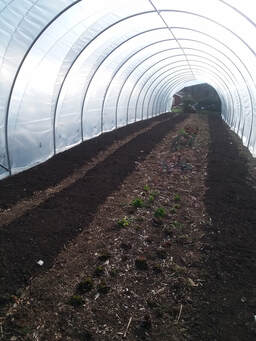
Depending on the soil you have on your site, you may be able to just dig it up, spread and dry it, and screen it. Of course, you can improve it by adding a small amount of your compost to it. Just make sure that you’re not selling a saturated clay soil as ‘topsoil’. That’s a quick way to irritate your customers. I’ve heard many people complain about the clay ‘topsoil’ that they’ve bought from other companies.
If you have a quarry nearby, you may be able to obtain mineral fines and mix that with leaf compost to produce manufactured topsoil.
Quality Control
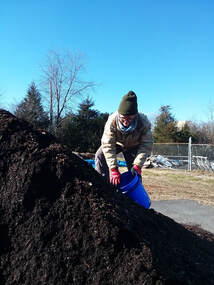
The four most important things you can do to maintain a high level of quality in your compost business products are to refuse feedstocks that may have persistent herbicides, repeatedly pick contaminants (mostly plastic) out of the material, make sure that it has thoroughly matured, and screen it. If you sell compost that damages your customers’ garden, your reputation will be ruined and you may even be exposed to a law suit. If you don’t offer a screened compost, most customers are going to be underwhelmed.
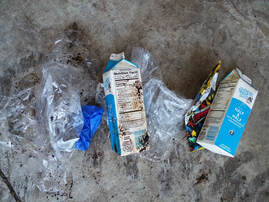
The most important thing you can do for mulch quality is to make sure that it doesn’t contain any glass or metal. You’d be amazed at what some tree services try to drop off. You must be strict!